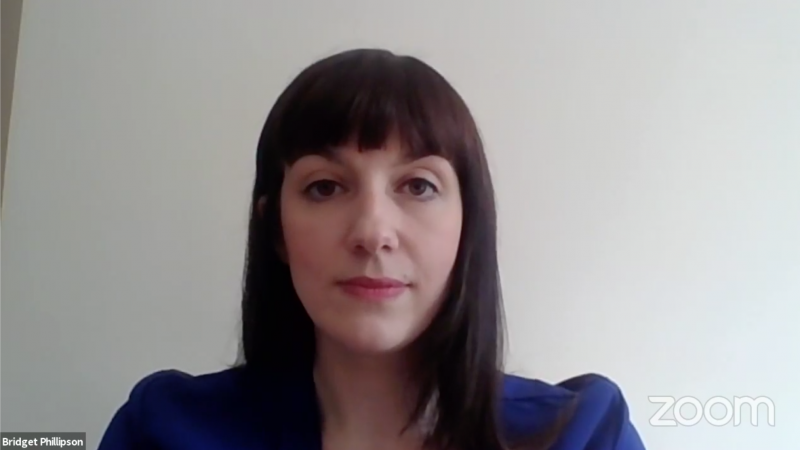
Labour frontbencher Bridget Phillipson has set out the party’s challenges and strategy on the path to creating a “social democracy of hope” in a conference organised by member organisation ‘Labour to Win’.
Addressing the online event by the new grouping – a joint project of ‘old right’ Labour First and Blairite network Progress – the new Shadow Chief Secretary to the Treasury shared her views on the party’s recent failures and new aims.
Phillipson told the Zoom call: “Our party cannot ever just become a parliamentary pressure group. We can and we must be a party of working people in every corner of our country, and we must learn to win power again.
“I’m proud that our membership today stands at well over half a million people. But that still means that 99 people in every 100 of our country aren’t members, and I’m worried that we’ve got out of the habit of talking to them.”
Arguing that “making our own echo chamber larger is no substitute for knocking its walls down”, she said: “I know that the people who need to hear from Labour frontbenchers most aren’t you.
“Nor are they the hundreds of thousands of people who follow Labour MPs on Twitter or like them on Facebook. Nor are they GC [general committee] delegates at CLP [Constituency Labour Party] meetings.”
Phillipson described the voters that Labour must speak to as such: “They don’t follow the news much, they don’t follow Labour politicians on Twitter and they don’t have time to follow the detail of policies that don’t affect them.”
The shadow cabinet member explained how Labour intends to approach appealing to such voters, saying: “To go forwards, we don’t need to reenact the past. But we do need to understand the priorities of the people who haven’t been giving us a hearing.
“We need to listen, learn and use their language. When people told us they thought we were going to spend money on things our country didn’t need, we can’t just tell them that they were wrong.
“When people complain about local services being terrible, and we nod and talk over them about the impact of austerity, we cannot be surprised that they don’t think we see things as they do.
“Our language and our framing must reflect the world as our electors see it, not as how we might discuss it at a GC. When people told us they didn’t trust us with their security, telling them that they’re wrong just gets us nowhere. We have to ask why and we have to fix it.”
She said one of the principle challenges facing Labour was reaching those voters who do not watch Prime Minister’s Questions and “ensuring that they see the contrast that we all see between Keir [Starmer] and [Boris] Johnson”.
On Labour’s 2019 general election performance, Phillipson said: “We didn’t just fail to win the election. The issue we need to face up to is that, whatever some people say, we also failed to win the argument. Making the same arguments again isn’t going to see us win next time.”
This was a reference to Jeremy Corbyn’s post-election Observer article, which read: “I am proud that on austerity, on corporate power, on inequality and on the climate emergency we have won the arguments and rewritten the terms of political debate. But I regret that we did not succeed in converting that into a parliamentary majority for change.”
The opposition frontbencher told Labour to Win: “We need to be alive to the concerns people have about tax and the economy… It’s no good having the correct view on everything if no-one trusts you to put it into practice.
“That means we need to be disciplined about the spending promises we make now – both about the response to the pandemic and about the next Labour government. The government spends huge amounts of money, but it doesn’t spend it all wisely and it doesn’t spend it all well.”
Setting out how Labour would take a different approach to the government’s “irresponsible” one, she said “every pound spent should be spent to achieve most” and made clear that the party would “not prejudge now” what its spending plans should be at the next general election.
Confirming that Labour will be “careful” about its commitments between now and 2024, Phillipson said: “We cannot be thought of as a party whose reaction to every problem is that the answer is more spending. It’s a habit we got into, and it’s a habit we need to break.”
She set three challenges for all Labour supporters:
- to spend more time “reaching people who don’t already vote for us than discussing our politics with people who do”
- to draw a contrast with the Tories by using “our framing and language of the voters”
- to change Labour’s culture and make it outward-facing
The Shadow Chief Secretary to the Treasury stressed the importance of communicating how Labour would “give people more control and more freedom over their own lives” by using the “language the Tories have captured over freedom and choice”.
On ‘culture wars’, she said: “The Tories want us to be drawn into seeking to divide people, rather than bringing people together in common cause. As a party, we’ll only win when we unite people right across our country with a sense of social justice, fairness and giving everybody opportunity to get on in life.”




More from LabourList
‘Why solidarity with Ukraine still matters’
‘Ukraine is Europe’s frontier – and Labour must stay resolute in its defence’
Vast majority of Labour members back defence spending boost and NATO membership – poll